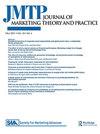10 years of consumer behavior in collaborative consumption: a systematic literature review of open access articles
IF 5.3
Q2 BUSINESS
引用次数: 0
Abstract
ABSTRACTCollaborative consumption (CC) is becoming a key concept in marketing. Despite the topic’s relevance, the academic literature on consumer behavior in collaborative consumption remains very fragmented. This present research aims to provide a systematic review of consumer behavior in collaborative consumption research in the existing literature. An extensive literature review was systematically conducted on collaborative consumption spread over the time period between 2010 to 2021 published journals which were identified from online academic and research databases of Web of science and EBSCO. A total of 97 conceptual and empirical articles were analyzed based on criteria such as year of publication, theoretical underpinning, methodological approaches, etc. The paper highlights the critical emergent themes and sub-themes, extensively used methodologies and analysis approaches, and dominant theoretical underpinnings. By providing the distribution schema of collaborative consumption articles based on the mentioned criteria and the future research areas, the present study will help future researchers understand the current status of collaborative consumption research in the marketing and consumer behavior discipline and take this research area forward. Our theme-based segregation of collaborative consumption gives a deeper insight to the managers of sharing services concerning the key motivations and constraints of collaborative consumption. This systematic literature review provides a holistic view of consumer behavior in collaborative consumption. It highlights three major research themes (customer-centric studies, sustainability-centric studies, and consumer trust studies) and their related and relevant sub-themes to date addressed in the research studies. Disclosure statementNo potential conflict of interest was reported by the author(s).Supplementary dataSupplemental data for this article can be accessed online at https://doi.org/10.1080/10696679.2023.2245548协作消费中的10年消费者行为:开放获取文章的系统文献综述
【摘要】协同消费(CC)正在成为市场营销中的一个重要概念。尽管该主题具有相关性,但关于协作消费中的消费者行为的学术文献仍然非常分散。本研究旨在对现有文献中合作消费研究中的消费者行为进行系统回顾。从Web of science和EBSCO的在线学术和研究数据库中识别出2010年至2021年期间发表的期刊,系统地对协作消费进行了广泛的文献综述。根据出版年份、理论基础、方法方法等标准,共分析了97篇概念性和实证性文章。本文强调了关键的新兴主题和副主题,广泛使用的方法和分析方法,以及主要的理论基础。本研究通过提供基于上述标准和未来研究领域的协同消费文章分布图式,有助于未来研究者了解市场营销和消费者行为学科中协同消费研究的现状,并推动这一研究领域向前发展。我们的基于主题的协作消费分离为共享服务的管理者提供了关于协作消费的关键动机和约束的更深入的见解。这篇系统的文献综述提供了协作消费中消费者行为的整体观点。它强调了三个主要的研究主题(以客户为中心的研究,以可持续发展为中心的研究和消费者信任研究)以及迄今为止在研究中讨论的相关和相关的子主题。披露声明作者未报告潜在的利益冲突。本文的补充数据可以在线访问https://doi.org/10.1080/10696679.2023.2245548
本文章由计算机程序翻译,如有差异,请以英文原文为准。
求助全文
约1分钟内获得全文
求助全文
来源期刊

Journal of Marketing Theory and Practice
BUSINESS-
CiteScore
6.80
自引率
6.70%
发文量
37
期刊介绍:
The Journal of Marketing Theory & Practice is devoted to the publication of peer-reviewed articles addressing substantive, managerial issues in marketing. In the context of developing, enhancing, and disseminating marketing knowledge, JMTP publishes both conceptual and empirical work, so long as the work provides strong implications for the managerial practice of marketing. Unlike other marketing journals that may be more focused on specific methodological approaches, deal with theoretical issues without regard to application, or represent various subfields of marketing, JMTP is positioned as a general marketing journal affording a quality outlet for more managerially-oriented research across the scope of the field.
 求助内容:
求助内容: 应助结果提醒方式:
应助结果提醒方式:


